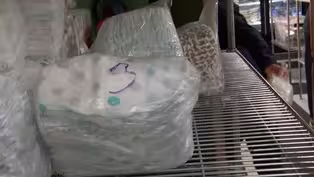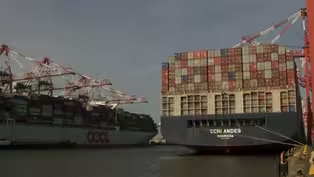NJ Spotlight News
Rutgers study: Accidental cases of child opioid poisoning
Clip: 9/27/2024 | 5m 3sVideo has Closed Captions
Interview: Dr. Howard Greller, Rutgers New Jersey Medical School
Small children are at risk of opioid poisoning from poorly handled medications, according to a new study from Rutgers researchers. The study of more than 200 cases of opioid poisoning among children ages one month to six years found the children had gotten their hands on loose medication, painkillers for pets and even a tissue with opioid residue.
Problems playing video? | Closed Captioning Feedback
Problems playing video? | Closed Captioning Feedback
NJ Spotlight News is a local public television program presented by THIRTEEN PBS
NJ Spotlight News
Rutgers study: Accidental cases of child opioid poisoning
Clip: 9/27/2024 | 5m 3sVideo has Closed Captions
Small children are at risk of opioid poisoning from poorly handled medications, according to a new study from Rutgers researchers. The study of more than 200 cases of opioid poisoning among children ages one month to six years found the children had gotten their hands on loose medication, painkillers for pets and even a tissue with opioid residue.
Problems playing video? | Closed Captioning Feedback
How to Watch NJ Spotlight News
NJ Spotlight News is available to stream on pbs.org and the free PBS App, available on iPhone, Apple TV, Android TV, Android smartphones, Amazon Fire TV, Amazon Fire Tablet, Roku, Samsung Smart TV, and Vizio.
Providing Support for PBS.org
Learn Moreabout PBS online sponsorshipAnd thanks to new research from Rutgers University, scientists have pinpointed the most likely sources for children who were exposed to opioids.
The most common substances contributing to fatal poisonings among kids under the age of five.
It turns out a grandparent's pill organizer, the family dog's pain medication and even discarded tissues are among the ways young ones get their hands on the potentially lethal drug.
Dr. Howard Geller is a medical toxicologist at the New Jersey Poison Control Center who led the study at Rutgers, New Jersey Medical School, studying exposure in babies as young as one month, up to six years old.
He joins me to share what they found.
Dr. Geller, good to talk to you.
I mean, when we're talking about the youngest among us, how do these accidental exposure typically occur in a household setting?
I think the safety is the key concern here.
And people are often not thinking about medications that they take as being a risk to others, particularly children and small adults.
So in our study, one of the things that we found was that while parents were often the source of the medication that child was exposed to.
Grandparents also contributed significantly.
And that's often because they're in an environment where they live by themselves.
They don't typically think that anyone could be exposed to their medications and they often may lead them out.
Yeah, I mean, maybe not as vigilant as a parent would be when there's a toddler running around.
But it was interesting, you also wrote in the report that even just residue on a tissue could become dangerous.
What's the difference between the toxicity of opioids in small children versus as an adult?
So the a child being much smaller and also typically a child is not a patient that would be exposed to an opioid smaller person dose that is meant for an adult and they have the risk of a greater impact, in effect, more toxicity.
And they're also generally naive to the medication.
And so they often will have a more significant clinical impact.
How effective, Dr. Greller are, you know, current public health campaigns in sort of raising awareness about just how dangerous this can be?
And what are some solutions that you and your team might recommend?
I think the public education is good.
I think that we always have room for growth and to do better and to more broadly disseminate the information.
Medication safety is a very, very important thing, not only for children but for adults as well.
So making sure that they remain in the bottles that they were originally prescribed and putting them up in a way so that there are places that children can't access them, and particularly for the opioids.
The importance of having naloxone available as a reversal agent where a child to be exposed or an adult.
Yes.
So I wonder then, would it be maybe in your purview, would it make sense that if someone's prescribed to an opioid, they also have, you know, easier access to naloxone to keep in their home?
Absolutely.
One of the things that people have been recommending for years now is called prescription of naloxone with any opioid prescription.
There are many efforts to make naloxone availability more broad.
And in New Jersey, you can go into almost any pharmacy and request naloxone without a prescription and often for a low or no fee.
Yeah.
Now, of course, we're seeing that naloxone, you know, is being distributed in schools given sort of the prevalence of this.
What's your take on that and its availability for school districts?
This is a public health issue and it is not meant to stigmatize any group.
Naloxone saves lives and it should be available as broadly as something like an automated external defibrillator is available.
So this is something that is an intervention that can help someone survive an overdose and really should just be carried by everybody if possible.
Yeah, that's a comparison that I've seen being made more frequently.
Dr. Howard Greller thank you so much for your time.
My pleasure.
Thank you.
Support for the medical report is provided by Horizon Blue Cross Blue Shield of New Jersey, an independent licensee of the Blue Cross Blue Shield Association.
Half of US families can’t afford diapers
Video has Closed Captions
Clip: 9/27/2024 | 4m 9s | NJ charities highlight the need during National Diaper Need Awareness Week (4m 9s)
Longshoremen prepare to strike next week
Video has Closed Captions
Clip: 9/27/2024 | 1m 31s | A port shutdown could disrupt supply chains and cause prices to rise (1m 31s)
Providing Support for PBS.org
Learn Moreabout PBS online sponsorship
- News and Public Affairs

Top journalists deliver compelling original analysis of the hour's headlines.

- News and Public Affairs

FRONTLINE is investigative journalism that questions, explains and changes our world.












Support for PBS provided by:
NJ Spotlight News is a local public television program presented by THIRTEEN PBS

